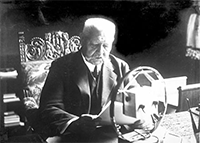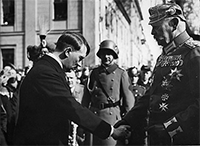Paul von Hindenburg: German War Hero, President
Part 3: The End of an Era
In January 1919, voters elected members to a Constituent National Assembly. A new constitution was in force, and Germany was a republic. Hindenburg retired in June, returning to Hanover, site of his first retirement. He was still a national hero, but he wanted a more quiet life. He wrote his memoirs, Mein Leben; they were very popular. Also in 1919, Hindenburg appeared before a government commission looking to find fault with the prosecution of the war. He insisted during his testimony that Germany had been on the verge of winning the war as late as 1918 but that the leaders of the new representative government had negotiated peace instead. The Weimar Republic had launched with Friedrich Ebert as President. An election for president was set to happen in June 1920. Hindenburg put his name forward as a candidate but didn't get to see himself elected because a military coup took control of Berlin and declared Wolfgang Kapp, a prominent government official, president. In the resulting civil unrest, a general strike led to violence in the streets and an uprising by Communist forces. The coup government collapsed, and troops arrested Kapp. He died in prison, awaiting trial for reason. A resurgent Reichstag extended Ebert's term of office for another five years. On May 14, 1921, Hindenburg's wife, Gertrud, died of cancer. They had married in 1879 and had had three children: Irmengard (1880), Oskar (1883), and Annemaria (1891). Ludendorff and Hindenburg had gone their separate ways by this time. Ludendorff was part of the Beer Hall Putsch, an attempt in November 1923 by Adolf Hitler and members of the Nazi Party to take over the government. The coup attempt failed, and Hitler and Ludendorff were among those arrested; the former was convicted and sent to prison, and the latter was acquitted after claiming that he was an accidental participant. Hindenburg spoke out, claiming for the need for national unity. Ebert died in February 1925, and the government scheduled a new presidential election. No candidate got the necessary majority of the votes, so the government proclaimed a runoff. Hindenburg, despite garnering the fewest votes of any of the candidates, was the choice for the right-leaning political parties for the runoff. Hindenburg barely won the second election and was proclaimed President of the Republic. At 78, he took office, on May 12, 1925. 
Hindenburg endured a handful of challenges as leader of the country. He advocated for the acceptance of the Locarno Treaties, which solidified European borders, guaranteeing that Alsace-Lorraine would remain in France; as well, Germany promised to keep troops out of the Rhineland and, further, never again to go to war with its European neighbors. This acceptance of defeat angered many conservatives in the country and led to a change in leadership of the Reichstag. Throughout his tenure as President, he struggled with governmental fragility, as majorities came and went; he even had trouble at times keeping his own Cabinet ministers. As a result, he sometimes stepped into the power vacuum himself, ruling by decree when things would not get done otherwise. (The constitution allowed for this, just.) The Great Depression was taking hold in Germany and elsewhere, and Hindenburg navigated a banking crisis and disagreements over the payments of reparations to the Allies, as stipulated in the Treaty of Versailles. Despite this, Hindenburg remained popular. He won re-election in 1932, not on the first ballot but again in the runoff, this time defeating Hitler. By this time, Hindenburg was 84. Hindenburg went through a number of government leaders and a number of chancellors. His choice for the latter in 1933 was none other than Hitler, who had served his time in prison and was once again the leader of the Nazi Party. In new elections, the Nazi Party won a majority. Soon, the new government had passed the Enabling Act, removing lawmaking powers from the Reichstag and giving them to the top-level government. As well, all political parties but the Nazi Party were banned; prohibited as well were labor unions. The national government took over running of the states. Hindenburg remained a widely popular figure, and Hitler was careful not to offend him or belittle him in public. Technically, the President could still relieve the Chancellor of his duties, and Hitler knew that the public would side with Hindenburg if that happened. Hindenburg did speak out against what he saw as governmental excesses, but Hitler and his subordinates did their utmost to minimize any interference. In the end, Hindenburg, like his wife, succumbed to cancer. He died at Aug. 2, 1934, at this home in Neudeck. The day before, Hitler and his Cabinet had passed a law abolishing the office of President and merging its powers with that of the Chancellor. When Hindenburg died, the republic died as well. First page > A Career Soldier > Page 1, 2, 3 |
|
Social Studies for Kids
copyright 2002–2026
David White



 Not all of the military was of a mind to revolt; as well, Hindenburg didn't want to send some of his troops to battle others. A large contingent of soldiers marched on the Chancellory on December 6, intending to take control of the government. The coup attempt fizzled, however, in the face of soldiers' finding common ground on the streets. A similar thing occurred on December 23, when a group of soldiers who still preferred a more authoritarian form of government clashed with more republican-minded sailors at the Imperial Palace in Berlin. At one point, angry rebel sailors broke into Command Headquarters and seized the officer in charge. The Government ordered its troops to use force to put down the rebellion; a large-scale refusal to do so resulted in another avoidance of violence.
Not all of the military was of a mind to revolt; as well, Hindenburg didn't want to send some of his troops to battle others. A large contingent of soldiers marched on the Chancellory on December 6, intending to take control of the government. The coup attempt fizzled, however, in the face of soldiers' finding common ground on the streets. A similar thing occurred on December 23, when a group of soldiers who still preferred a more authoritarian form of government clashed with more republican-minded sailors at the Imperial Palace in Berlin. At one point, angry rebel sailors broke into Command Headquarters and seized the officer in charge. The Government ordered its troops to use force to put down the rebellion; a large-scale refusal to do so resulted in another avoidance of violence. That party had received the most votes in the 1932 election, and Hitler argued that that gave him the responsibility to act as Chancellor. Hindenburg reluctantly agreed. (The two did not like each other and never did.) Right away, Hitler took aim at a greater role. He convinced Hindenburg to dissolve the Reichstag and then, after the
That party had received the most votes in the 1932 election, and Hitler argued that that gave him the responsibility to act as Chancellor. Hindenburg reluctantly agreed. (The two did not like each other and never did.) Right away, Hitler took aim at a greater role. He convinced Hindenburg to dissolve the Reichstag and then, after the 
